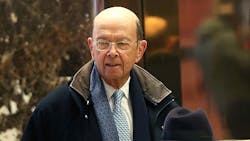Billionaire Wilbur Ross, nominated by Donald Trump to serve as Commerce Secretary, is warning America’s trading partners to practice “fair trade” and cut state control over business if they want access to the world’s biggest economy.
“The United States should provide that access to nations who agree to play by our standards of fair trade,” Ross said in prepared testimony to be delivered Wednesday in Washington before the Senate Commerce Committee, which will vote on his nomination. “We should not put up with malicious trading activities, state-owned enterprises or subsidized production.”
While Ross didn’t mention any country by name in the advance copy of his remarks, the reference to state-led business and subsidized production could be seen as an indirect jab at China. The U.S. recently launched a complaint to the World Trade Organization alleging that China has been suppressing aluminum prices by subsidizing domestic producers.
President-elect Trump, who will be inaugurated Friday, has promised to take a tougher approach toward China and to renegotiate the 23-year-old North American Free Trade Agreement, which he has called a “disaster.”
Ross, 79, would be one of the most seasoned business leaders on Trump’s economic team. As a private-equity investor, he restructured companies across a range of industries including steel, banking and textiles. Bloomberg values his fortune at $2.9 billion, and in financial disclosures released Tuesday, he revealed assets topping $336 million, including at least $150 million held in bank accounts and an art collection worth more than $50 million.
Past Manufacturing Experience
In Wednesday’s prepared statement, Ross said the companies he’s invested in operated in 23 countries, and he’s been in complicated situations involving the U.S. manufacturing sector. He said he’s probably had more direct experience than any Cabinet nominee with unfair trade practices such as non-tariff barriers and state subsidies of foreign exports.
“I am not anti-trade,” he said. “I am pro-trade. But I am pro-sensible trade, not trade that is detrimental to the American worker and to the domestic manufacturing base.”
Ross’s vast business holdings may open him to the same line of attack Mitt Romney faced when he ran for president in 2012 -- that he was a corporate raider who flipped companies for profit while laying off American workers. The Center for American Progress, a left-leaning think tank, says Ross’s corporate holdings represent a conflict of interest.
In an ethics agreement released Tuesday, Ross said he’ll resign his positions with 38 entities. Those include Invesco Ltd., which bought Ross’s private-equity firm in 2006, as well as seven named subsidiaries. He will also divest his stakes in publicly traded companies and some bond positions within 90 days of confirmation and his interests in WL Ross private equity funds, which are less liquid, within 180 days of his being confirmed.
By Andrew Mayeda
About the Author
Bloomberg
Licensed content from Bloomberg, copyright 2016.
